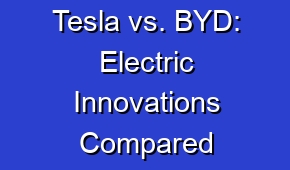Electric Car Technology

Electric car technology is a clean and sustainable transportation solution. It utilizes electricity instead of fossil fuels, reducing emissions and dependence on oil. With advancements in battery technology and charging infrastructure, electric cars are becoming more practical and popular.
Electric car technology is revolutionizing the automotive industry. With the growing concern for the environment, electric cars have become increasingly popular. These vehicles rely on electric motors instead of traditional combustion engines, resulting in zero tailpipe emissions. The electric car market is rapidly expanding, with major automakers investing heavily in research and development. Improved battery technology has extended the range of electric cars, addressing the previous concern of limited driving distance. Additionally, advancements in charging infrastructure are making it easier for electric car owners to recharge their vehicles. As a result, more consumers are considering switching to electric cars as a sustainable and cost-effective transportation option.
| Electric Car Technology: A sustainable transportation solution for a greener future. |
| Electric cars use electric motors powered by rechargeable batteries for propulsion. |
| The range of electric cars has significantly improved in recent years. |
| Regenerative braking in electric cars helps to extend the battery life. |
| Electric cars produce zero tailpipe emissions, reducing air pollution and carbon footprint. |
- Electric cars: Environmentally friendly vehicles that run on electricity.
- Electric motors: Powertrain components that convert electrical energy into mechanical energy.
- Rechargeable batteries: Energy storage devices used to power electric cars.
- Range: The distance an electric car can travel on a single charge.
- Regenerative braking: A feature that converts kinetic energy into electrical energy while slowing down the car.
How does electric car technology work?
Electric car technology uses rechargeable batteries to power electric motors, which propel the vehicle. The batteries are charged by plugging the car into an electrical outlet. Electric cars produce zero tailpipe emissions and are considered more environmentally friendly than traditional gasoline-powered vehicles.
What are the advantages of electric cars?
Electric cars offer several advantages, including lower operating costs, reduced reliance on fossil fuels, and a quieter driving experience. They also contribute to improved air quality, as they produce no exhaust emissions. Additionally, electric cars benefit from government incentives and can enjoy convenient charging options at home or public charging stations.
Are electric cars better for the environment?
Yes, electric cars are better for the environment compared to gasoline-powered vehicles. They produce zero tailpipe emissions, reducing air pollution and greenhouse gas emissions. However, it is important to consider the source of electricity used to charge electric cars, as it can impact their overall environmental impact.
What is the range of an electric car?
The range of an electric car refers to the distance it can travel on a single charge. It varies depending on the specific model and battery capacity. Generally, electric cars today can achieve ranges between 100 to 300 miles on a full charge. Advances in battery technology are continuously increasing the range of electric vehicles.
How long does it take to charge an electric car?
The charging time for an electric car depends on the charging method and the car’s battery capacity. Level 1 charging, which uses a standard household outlet, can take up to 20 hours for a full charge. Level 2 charging stations, commonly found at homes and public charging points, can charge an electric car in 4 to 8 hours. DC fast charging stations can provide an 80% charge in around 30 minutes.
What is regenerative braking in electric cars?
Regenerative braking is a feature in electric cars that converts the kinetic energy generated during braking into electrical energy. This energy is then stored in the car’s battery, increasing its charge. Regenerative braking helps improve the overall efficiency of electric cars and extends their driving range.
Are electric cars more expensive than gasoline cars?
Electric cars generally have a higher upfront cost compared to gasoline cars, primarily due to the expense of battery technology. However, they can offer lower operating costs over time, as electricity is typically cheaper than gasoline. Additionally, government incentives and tax credits can help offset the initial cost of purchasing an electric car.
What is the lifespan of an electric car battery?
The lifespan of an electric car battery can vary depending on several factors, including usage patterns, charging habits, and temperature conditions. On average, modern electric car batteries can last between 8 to 15 years or more. Manufacturers often provide warranties for their batteries, ensuring their durability and performance.
Can electric cars be charged at home?
Yes, electric cars can be charged at home using a standard electrical outlet or a dedicated charging station. Home charging is convenient and allows for overnight charging, ensuring the car is ready to go in the morning. Installing a home charging station can provide faster charging times and additional safety features.
What is the cost of charging an electric car?
The cost of charging an electric car depends on the electricity rates in your area and the efficiency of the car’s battery. On average, it is cheaper to charge an electric car compared to refueling a gasoline car. Charging costs can vary, but electric cars typically offer a lower cost per mile traveled compared to gasoline cars.
Are electric cars suitable for long-distance travel?
Electric cars are becoming increasingly suitable for long-distance travel due to advancements in battery technology and the growing network of charging stations. However, it is important to plan charging stops along the route and consider the charging time required. Fast-charging stations can significantly reduce the time spent on long-distance trips.
What are the different types of electric car charging stations?
There are three main types of electric car charging stations: Level 1, Level 2, and DC fast charging. Level 1 chargers use a standard household outlet, Level 2 chargers require a dedicated charging station, and DC fast chargers provide rapid charging at public stations. Each type offers different charging speeds and compatibility with electric car models.
Can electric cars generate their own electricity?
Electric cars cannot generate their own electricity. They rely on external power sources, such as charging stations or electrical outlets, to charge their batteries. However, emerging technologies, such as solar panels integrated into the car’s body, can help supplement the charging process with renewable energy.
What is the maintenance required for electric cars?
Electric cars generally require less maintenance compared to gasoline cars, as they have fewer moving parts. Regular maintenance includes checking and servicing the battery, tires, brakes, and other components. Electric car owners should also ensure the software and firmware of the vehicle’s electric systems are up to date for optimal performance.
Can electric cars be charged using renewable energy sources?
Yes, electric cars can be charged using renewable energy sources, such as solar or wind power. By utilizing renewable energy for charging, electric cars can further reduce their carbon footprint and environmental impact. Homeowners can install solar panels or connect to renewable energy grids to power their electric cars.
What is the future of electric car technology?
The future of electric car technology looks promising, with ongoing advancements in battery technology, charging infrastructure, and vehicle efficiency. The development of longer-lasting batteries, faster charging capabilities, and increased driving ranges will continue to drive the adoption of electric cars and reduce their environmental impact.
Are electric cars suitable for cold climates?
Electric cars can operate in cold climates, but extreme temperatures can affect their performance and range. Cold weather can reduce the efficiency of the battery and require additional energy for heating the car’s interior. However, advancements in battery thermal management systems are improving the performance of electric cars in cold weather conditions.
What are the safety considerations for electric cars?
Safety considerations for electric cars include proper handling and maintenance of high-voltage components, ensuring charging equipment meets safety standards, and understanding emergency procedures in case of accidents or battery-related incidents. Electric cars undergo rigorous safety testing and adhere to strict regulations to ensure their safe operation on the road.





















